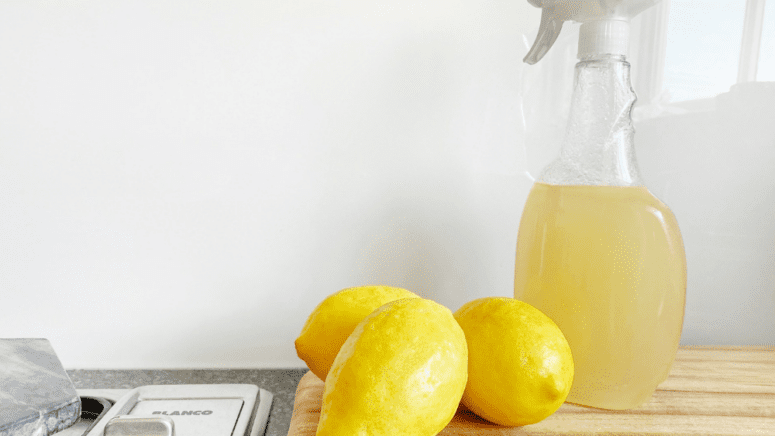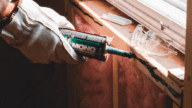How to Deodorize a House: Attack the Root Cause Before Your Home Hits the Market
- Published on
- 11 min read
-
 Amanda Derrick, Contributing AuthorClose
Amanda Derrick, Contributing AuthorClose Amanda Derrick Contributing Author
Amanda Derrick Contributing AuthorAmanda is a mechanical engineer, business strategist, and real estate enthusiast. She's experienced in making a home look its best—remodels, material selection, budgeting, and interior design have all been constant activities as an innovative homeowner. Designing her own custom home (alongside her husband, the architect) has brought Amanda into the world of real estate in a big way.
-
 Taryn Tacher, Senior EditorClose
Taryn Tacher, Senior EditorClose Taryn Tacher Senior Editor
Taryn Tacher Senior EditorTaryn Tacher is the senior editorial operations manager and senior editor for HomeLight's Resource Centers. With eight years of editorial and operations experience, she previously managed editorial operations at Contently and content partnerships at Conde Nast. Taryn holds a bachelor's from the University of Florida College of Journalism, and she's written for GQ, Teen Vogue, Glamour, Allure, and Variety.
Does your home smell like a barn or Don Draper’s ashtray? Is your nose so used to the stench that someone else had to tell you that your house won’t sell in this condition? And if so, how do you get rid of those bad smells in your house?
First, step away from the Glade plug-in air fresheners, scented candles, and cans of Febreze. It’s time to learn how to deodorize a house by attacking the root of the cause: bacteria. Masking the problem with nausea-inducing fruity fragrances will only have homebuyers reaching for the Pepto-Bismol.
“You have to get rid of the problem, whether it’s the cats, litter boxes, dogs, or smoking,” says top-selling Cincinnati real estate agent Jon Bowling. “If you’re not willing to do that, I might not take your listing,” adding that it’s very difficult to sell a home with unpleasant odors.
For every foul odor, there’s a different remedy, so let’s go through how to get rid of bad smells in your house, including:
- A dirty or messy house
- Walls drenched in cigarette smoke
- Pet odors seeped into carpets and furniture
- Damp, mildewy bathrooms or closed-in spaces
Then, we’ll guide you through the types of smells you should add back into a home that appeal to the widest pool of buyers.
General tips and tricks to keep your house smelling fresh
Even if you’ve religiously avoided chain-smoking for the past 50 years (thanks, CDC) and have never let a furry friend set paw in your space, there’s still a chance your house might be hiding some questionable aromas. And let’s be honest, when it comes to home showings, a little extra freshness never hurt anyone.
To start, roll up your sleeves, grab your cleaning supplies, and give your house a deep cleaning. Then, follow these tips and tricks to get rid of those bad smells in your home and leave it looking so spotless and fresh that even the most stubborn odors will admit defeat and not dare return.
Your Deep Cleaning Checklist
We’ve put together a checklist that you can print out and work on as you move through the house on your deep cleaning quest.
Don’t leave dirty laundry lying around
Piles of clothes crammed into laundry baskets throughout the house can create bad odors, especially if you’ve got sweaty athletic wear inside your gym bag or damp towels collecting mildew. Don’t let laundry linger for extended periods of time. It might be the cause of the smell you can’t quite pinpoint. Get your clothes and linens into the washing rotation.
Wash those sheets and comforters
While we dream at night, our beds collect bacteria, fungus, and dead skin cells in truly filthy fashion. That can’t smell good. Wash your sheets once a week to keep odors at bay, and get rid of funky smells in your comforters and duvets by adding a few cups of white vinegar to the washing machine.
Ruthlessly toss expired food
Meat, kale, potatoes, milk — when spoiled, these groceries exude the worst kind of stench. Go through your fridge and ditch any expired goods and make sure nothing stinks when you first open the doors.
Enforce a ‘no shoes in the house’ policy
Shoes track in dirt, grime, germs, and who knows what else from the outside world, making it tough to keep your floors looking pristine and smelling fresh.
Do the dishes
Resist the temptation to let pans “soak” or leave last night’s dinner dishes for the morning, especially if you whipped up something with a strong aroma. Tackle spills in the kitchen — and anywhere else — immediately to keep odors from overstaying their welcome.
Deep clean your carpets and rugs
Carpets and rugs have a dirty little secret: They hoard smells from every dinner party, pet accident, and coffee spill. Rent a steam cleaner or call in a pro to evict those odors and restore their fresh, fluffy glory.
Open those windows
Weather permitting, throw open your windows and let the fresh air do its thing. A little breeze can clear out stale odors and make your home feel as airy as a mountaintop retreat.
Keep the bathroom sparkling
Bathrooms have a talent for holding on to unpleasant odors. Scrub surfaces with a vinegar and baking soda combo, and take out the trash often. Want bonus points? Hang some eucalyptus in the shower for a spa-like scent that says, “Welcome to luxury.”
Take the trash out daily
Even if your trash can isn’t overflowing, it could still be hosting a stink party. Take it out daily and rinse the bin weekly, sprinkling some baking soda at the bottom for good measure. It’s the little things that keep the funk away!
Set up odor traps across the house
Leave out bowls of baking soda or distilled vinegar to absorb odors like magic. Alternatively, create your own deodorizing sachets by filling coffee filters with baking soda, tying them shut with string or ribbon, and putting them on shelves or in drawers. Keep closets and dressers smelling fresh with dryer sheets tucked away or stuffed into clothes pockets.
Get rid of the cigarette smoke stench
Smoke is one of the most persistent and pervasive odors, prone to cling to your walls, ceiling, carpet, upholstery, and clothing. Known as third-hand smoke, the lingering odor isn’t just unpleasant — it can cause health issues as well.
The first task, as Bowling noted, is to remove the cause. No more smoking in the house, even in just a single room. Smoke seeps into everything, using your air ducts to travel throughout your home.
Once you or the smoker in your household has officially taken their habit far away from the home, it’s time to do some damage control.
Joshua Miller, president of Rainbow Restoration, a home restoration company established in 1981, gives homeowners these tips to mitigate existing cigarette smoke odors:
Round up every washable item in sight
Remember how your clothes and hair would smell after a night out at a smoky bar? That stench now emanates from all your home’s drapes, rugs, furniture, linens, and all the contents of your closet — and each item will need to either be tossed, placed in storage, or put through the wash.
Put your soft items through the wash
Any items that you’re keeping in the house should be washed in cold water with at least two cups of vinegar added to the machine. It may take multiple washes to fully eradicate the smell.
Take items that can’t be machine-washed, like window treatments, to the dry cleaners and let them know you need to eliminate the smoke odor.
Once the items are cleaned, don’t bring them back into a house that still reeks of smoke. Protect them with garbage bags and put them in storage until you’ve completed the rest of the steps.
Spread baking soda over carpets and big furniture
With a large colander, sprinkle a deodorizing powder like baking soda on carpets and big furniture. Let it sit for at least 30 minutes to an hour. Then vacuum it up, using your vacuum attachments.
Scrub down surfaces using vinegar
Scrub the walls and ceilings with a water and vinegar solution, as ceilings often trap smoke odors due to the way cigarette smoke rises.
Repaint walls and ceilings
If the smell persists, it’s time for a fresh coat of paint, starting with a solvent-based, stain-blocking primer. If that sounds like too much, you can always hire professionals to do the job. Just remember, all the effort won’t make a difference unless you’ve removed the smoke source first.
Don’t let ‘wet dog smell’ ruin your sale
Oh, how we love our furry friends. They’re cute, they’re cuddly, and we forgive all their little messes!
Unfortunately, potential buyers of your home won’t have the same affinity for Lola and Fido, or the shedding and odors they leave behind. They’ll only wonder if purchasing your house also means smelling traces of your dog or cat for the rest of their lives.
Fortunately, you can attack most pet odors head-on with some basic cleanup and the right products:
Run a vacuum over carpets and furniture
Get pet hair and dander out of your carpet fibers and couch creases with an initial run of the vacuum. Be sure to spend extra time on carpeted stairs where pet hair tends to collect in the corners. Then, apply a layer of baking soda to trouble spots. Come back in a few hours later and vacuum it up.
Toss pet beds and blankets in the wash
Throw all the fabrics your pets lie on — beds, blankets, pillows or cushions — into the washing machine, and crank the water up to the hottest recommended setting. If pet odors linger, give them another wash with an enzymatic cleaner like Rocco & Roxie or MisterMax for extra odor-fighting power.
Deal with trouble spots on the carpet
If the cleaning methods above don’t seem to be tackling pet odor issues, you may have overlooked an older pet accident. Black lights are a great way to identify dried soiled areas.
Once you’ve identified any trouble areas, rent a carpet cleaner machine from your local grocery or hardware store or hire a carpet cleaning service for proper cleanup.
Cleaning up pet urine that’s already settled on hardwood floors is another story. If the floors are salvageable, try using a hardwood-safe enzymatic cleaner to deodorize the spot.
Take preventive measures
The most powerful tool for keeping your home free of pet odors? Prevention. Regularly cleaning your pet’s bedding, litter box or cage, frequent vacuuming, and managing accidents promptly will keep your home from hanging on to foul smells.
Turn musty and damp into springtime fresh
Bathrooms are high-traffic spaces, and as hubs for humidity, damp towels, and stagnant airflow, they often absorb unpleasant smells.
Doyle James, retired president of Mr. Rooter Plumbing, has some insightful tips to breathe air, light, and freshness into these spaces:
Ventilate to increase fresh airflow
Air out bathrooms by turning on fans and opening windows to get the fresh air circulating. This also keeps humidity in check to prevent mildew growth. Leave the door open when the bathroom’s not in use to keep air circulating.
Hang towels separately
This will prevent them from getting musty and help them dry out faster. When drying towels on a rack, be sure to leave plenty of space between each towel.
Add a few capfuls of bleach to your towel and rug washes
Towels and bath mats should be washed on a regular basis, ideally at least once a week. To eliminate odors that stick to fabrics even after a full wash cycle, add a 50/50 bleach and water mix to the washing machine and you’ll notice that everything smells fresh and clean.
Get rid of mold and mildew from the shower
Make sure to air out the shower after each use. You may need to clean your shower curtain to prevent mold from growing (cloth shower curtains clean up easily in the washing machine with bleach water). To clean your tiles and grout, apply a vinegar and water mixture and scrub down the surface with a grout brush. Be sure to spay down your shower after each use with a Daily Shower Cleaner.
Check for leaks around your bathroom fixtures
The tub, sink, or toilet could be leaking and causing odors. Replace the seal under the toilet at the floor if you find water on your floor on a regular basis. If water pools under the sink, you’ll need to check for a leak in a pipe and contact a plumber to determine the cause.
Clean out your drains
If bad odors are coming from a drain, try pouring a cup of baking soda down the drain followed by a cup of vinegar. Leave it for 30 minutes and pour hot water down the drain.
Don’t ignore musty smells in dark, damp areas
There’s another reason why you don’t want musty and damp smells in your home — they could indicate a much bigger issue. Odors could be telling you that mold or mildew is hiding.
“We had a home with a storage area in a basement with a musty, moldy smell,” Bowling says. “When we were under contract, we had to have a professional remediation company come to do a cleanout. There wasn’t enough ventilation, and when we pulled some insulation away, we found discoloration that needed to be treated professionally, which cost the sellers $1,200.”
Check your bathrooms and basement for odors, moisture, and proper ventilation. Not only will your home sell faster when it smells good, but you’ll also prevent surprises from cropping up during the home inspection.
Once you’ve deodorized, keep smells simple
Certain smells scientifically put people in the mood to buy stuff, whether it’s a waft of pure leather at the shoe store, a hint of pine at Christmas time, or the alluring aroma of perfume at the mall.
However, it’s easy to go overboard with artificial smells that are overwhelmingly strong or make buyers wonder if you’re trying to hide something. Avoid plug-in air fresheners or sprays, and instead stick to smells on the neutral end of the spectrum.
For a fresh, subtle citrus scent, try a natural approach. Add a few drops of lemon or orange essential oil to a spray bottle for a quick mist, toss small citrus rinds down the garbage disposal, or simmer sliced citrus in water on the stove.
The bottom line is that foul odors can be a major deterrent to buyers. Investing in preventing and removing unpleasant smells is a sure way to increase your home’s value, marketability, and appeal.
So open up your windows, grab some baking soda and vinegar, and don’t be afraid to call in the pros or spend a little on carpet and paint if you can’t get those smells out on your own. It’ll be worth it!
Header Image Source: (Precious Plastic Melbourne / Unsplash)
- "How Often Should You Wash Your Sheets?," Sleep Foundation, Daniel Noyed (January 2023)
- "How to Use Baking Soda to Absorb Odors (Plus, the Science of Why It Works)," Martha Stewart, Lauren Wellbank (September 2023)
- "Thirdhand Smoke Harms People Even After Smoking Stops," American Nonsmokers' Rights Foundation (September 2021)
- "How To Green Clean the Grout In Your Shower & Bathroom," Apartment Therapy (May 2023)
- "The Smells That Make Shoppers Spend More," Business News Daily, Marisa Sanfilippo (January 2024)
- "Scents That Make Sense When Selling Your Home," U.S. News (February 2023)






